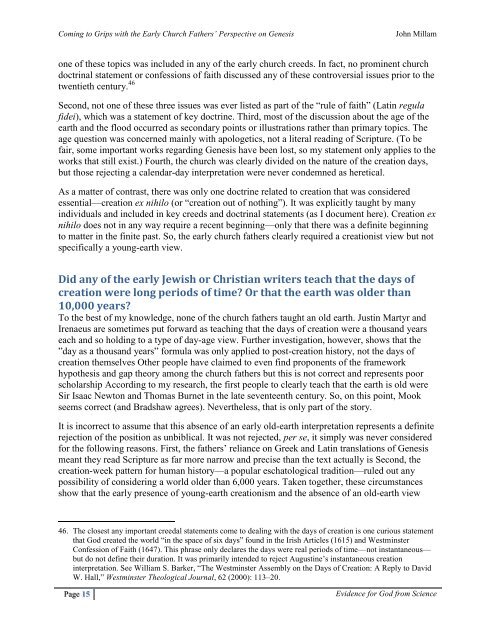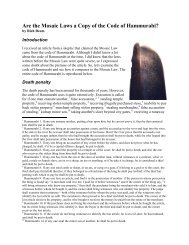Coming to Grips with the Early Church Fathers - Evidence for God ...
Coming to Grips with the Early Church Fathers - Evidence for God ...
Coming to Grips with the Early Church Fathers - Evidence for God ...
Create successful ePaper yourself
Turn your PDF publications into a flip-book with our unique Google optimized e-Paper software.
<strong>Coming</strong> <strong>to</strong> <strong>Grips</strong> <strong>with</strong> <strong>the</strong> <strong>Early</strong> <strong>Church</strong> Fa<strong>the</strong>rs’ Perspective on Genesis John Millam<br />
one of <strong>the</strong>se <strong>to</strong>pics was included in any of <strong>the</strong> early church creeds. In fact, no prominent church<br />
doctrinal statement or confessions of faith discussed any of <strong>the</strong>se controversial issues prior <strong>to</strong> <strong>the</strong><br />
twentieth century. 46<br />
Second, not one of <strong>the</strong>se three issues was ever listed as part of <strong>the</strong> “rule of faith” (Latin regula<br />
fidei), which was a statement of key doctrine. Third, most of <strong>the</strong> discussion about <strong>the</strong> age of <strong>the</strong><br />
earth and <strong>the</strong> flood occurred as secondary points or illustrations ra<strong>the</strong>r than primary <strong>to</strong>pics. The<br />
age question was concerned mainly <strong>with</strong> apologetics, not a literal reading of Scripture. (To be<br />
fair, some important works regarding Genesis have been lost, so my statement only applies <strong>to</strong> <strong>the</strong><br />
works that still exist.) Fourth, <strong>the</strong> church was clearly divided on <strong>the</strong> nature of <strong>the</strong> creation days,<br />
but those rejecting a calendar-day interpretation were never condemned as heretical.<br />
As a matter of contrast, <strong>the</strong>re was only one doctrine related <strong>to</strong> creation that was considered<br />
essential—creation ex nihilo (or “creation out of nothing”). It was explicitly taught by many<br />
individuals and included in key creeds and doctrinal statements (as I document here). Creation ex<br />
nihilo does not in any way require a recent beginning—only that <strong>the</strong>re was a definite beginning<br />
<strong>to</strong> matter in <strong>the</strong> finite past. So, <strong>the</strong> early church fa<strong>the</strong>rs clearly required a creationist view but not<br />
specifically a young-earth view.<br />
Did any of <strong>the</strong> early Jewish or Christian writers teach that <strong>the</strong> days of<br />
creation were long periods of time? Or that <strong>the</strong> earth was older than<br />
10,000 years?<br />
To <strong>the</strong> best of my knowledge, none of <strong>the</strong> church fa<strong>the</strong>rs taught an old earth. Justin Martyr and<br />
Irenaeus are sometimes put <strong>for</strong>ward as teaching that <strong>the</strong> days of creation were a thousand years<br />
each and so holding <strong>to</strong> a type of day-age view. Fur<strong>the</strong>r investigation, however, shows that <strong>the</strong><br />
”day as a thousand years” <strong>for</strong>mula was only applied <strong>to</strong> post-creation his<strong>to</strong>ry, not <strong>the</strong> days of<br />
creation <strong>the</strong>mselves O<strong>the</strong>r people have claimed <strong>to</strong> even find proponents of <strong>the</strong> framework<br />
hypo<strong>the</strong>sis and gap <strong>the</strong>ory among <strong>the</strong> church fa<strong>the</strong>rs but this is not correct and represents poor<br />
scholarship According <strong>to</strong> my research, <strong>the</strong> first people <strong>to</strong> clearly teach that <strong>the</strong> earth is old were<br />
Sir Isaac New<strong>to</strong>n and Thomas Burnet in <strong>the</strong> late seventeenth century. So, on this point, Mook<br />
seems correct (and Bradshaw agrees). Never<strong>the</strong>less, that is only part of <strong>the</strong> s<strong>to</strong>ry.<br />
It is incorrect <strong>to</strong> assume that this absence of an early old-earth interpretation represents a definite<br />
rejection of <strong>the</strong> position as unbiblical. It was not rejected, per se, it simply was never considered<br />
<strong>for</strong> <strong>the</strong> following reasons. First, <strong>the</strong> fa<strong>the</strong>rs’ reliance on Greek and Latin translations of Genesis<br />
meant <strong>the</strong>y read Scripture as far more narrow and precise than <strong>the</strong> text actually is Second, <strong>the</strong><br />
creation-week pattern <strong>for</strong> human his<strong>to</strong>ry—a popular escha<strong>to</strong>logical tradition—ruled out any<br />
possibility of considering a world older than 6,000 years. Taken <strong>to</strong>ge<strong>the</strong>r, <strong>the</strong>se circumstances<br />
show that <strong>the</strong> early presence of young-earth creationism and <strong>the</strong> absence of an old-earth view<br />
46. The closest any important creedal statements come <strong>to</strong> dealing <strong>with</strong> <strong>the</strong> days of creation is one curious statement<br />
that <strong>God</strong> created <strong>the</strong> world “in <strong>the</strong> space of six days” found in <strong>the</strong> Irish Articles (1615) and Westminster<br />
Confession of Faith (1647). This phrase only declares <strong>the</strong> days were real periods of time—not instantaneous—<br />
but do not define <strong>the</strong>ir duration. It was primarily intended <strong>to</strong> reject Augustine’s instantaneous creation<br />
interpretation. See William S. Barker, “The Westminster Assembly on <strong>the</strong> Days of Creation: A Reply <strong>to</strong> David<br />
W. Hall,” Westminster Theological Journal, 62 (2000): 113–20.<br />
Page 15 <strong>Evidence</strong> <strong>for</strong> <strong>God</strong> from Science






